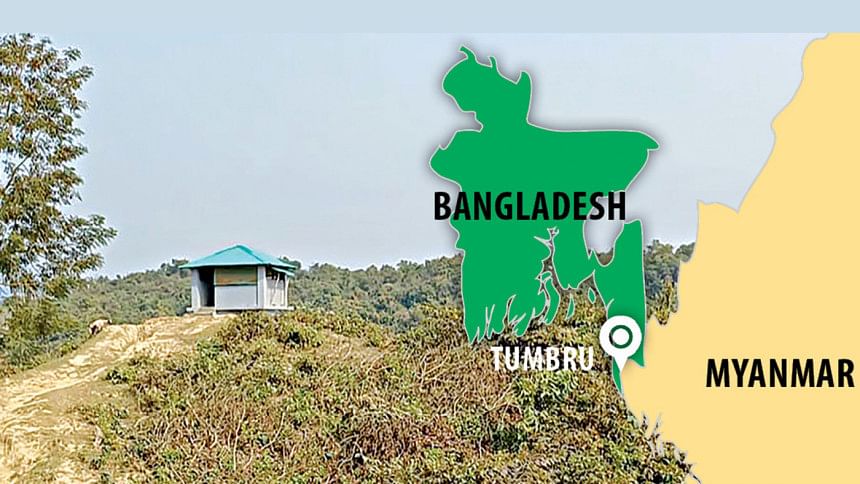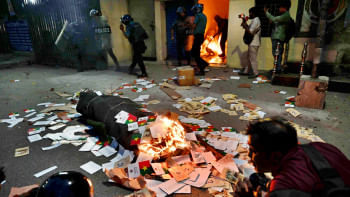Global, regional crises: Experts bat for pragmatic foreign policy

Experts yesterday urged Bangladesh to take a pragmatic foreign policy to deal with the challenges, including the worsening situation in Myanmar, in a changing world.
Violent situation prevailing in the eastern part of Myanmar, especially in Rakhine and Chin states bordering Bangladesh, is a big reason to worry, they added.
They said the absence of political consensus in Bangladesh is causing detrimental impact on diplomatic, economic, and geopolitical fronts.
Speaking at a programme in the capital's Brac Centre Inn they also raised concerns about the lack of transparency regarding government negotiations, emphasising the absence of parliamentary discussions on crucial matters such as the Rohingya crisis.
Titled, "Rifts in the Global Order and the Rise of Multipolarity: Counterbalancing Strategies for Bangladesh," South Asian Network on Economic Modeling (SANEM) organised the programme.
Dr Lailufar Yasmin, professor and chairperson of the Department of International Relations at Dhaka University, chaired the discussion.
Brig Gen (retd) M Shakhawat Hossain, former election commissioner and Senior Fellow at the South Asian Institute of Policy and Governance of North South University; Ambassador M Humayun Kabir, president of the Bangladesh Enterprise Institute (BEI); and Dr Imtiaz Ahmed, professor of the Department of International Relations at Dhaka University, took part in the discussion.
Shakhawat said it is still unknown where the ongoing violence in Rakhine will stop. Along with that, the radical nationalism that is developing in India and Myanmar can also threaten the security of Bangladesh.
He also said that the US-led unipolar world order is still in place, which is beginning to crumble.
Shakhawat also said Bangladesh's foreign policy -- friendship to all and malice to none -- is not working right now.
'I am worried about what is happening in our neighbouring country Myanmar. I am especially worried about Myanmar's Chin and Rakhine states. There is instability. We don't know where it will end up," he said
He concluded with a call to action, urging Bangladesh to chart its own path.
Humayun Kabir said changes are now taking place at a rapid pace. He outlined three layers of transformation, starting with the erosion of global norms and order.
Reflecting on past consensus, he noted, "The idea was that the international community should respect sovereignty and the world should enjoy equity."
Addressing the concept of multi-polarity, he questioned, "China wants to become like the US. India wants to become like the US. So where is the multi-polarity everybody is talking about?"
He expressed concerns over diminishing guarantees of sovereignty and privacy, saying, "Sovereignty is no longer a guarantee… privacy is no longer a guarantee. Everybody is being spied on. Where is human sanctity, human dignity?"
Concluding with a note of caution, he urged vigilance in assessing regional developments, stating, "We have to be careful about how our region is evolving."
Dr Ahmed positioned Bangladesh favourably in this multipolar world, stating, "Bangladesh is better placed when it comes to multi-polarity."
He underscored the importance of professionalism and global engagement for Bangladesh's success.
Dr Ahmed emphasised the inevitability of multipolarity, stating, "In no way can we go back to unipolarity."
He urged Bangladesh to enhance its engagement with regional powers like India and China, asserting, "Bangladesh needs to engage with India and China on a much bigger scale."
Dr Lailufar Yasmin noted the emergence of a new assertive Bangladesh on the global stage, prompting the necessity to develop indigenous policies tailored to the country's population.
She advocated for interdisciplinary collaboration to foster the holistic development of Bengalis, highlighting the importance of a multifaceted approach to national growth.
She highlighted the evolving centre of gravity in international politics, noting, "In international politics, the centre of gravity is gradually shifting toward Asia."
She underscored Bangladesh's pivotal role as a gateway to Northeast India.
She said, "When you do not write your own story, another person will write it from their vantage point. That is why we have to write our own story."

 For all latest news, follow The Daily Star's Google News channel.
For all latest news, follow The Daily Star's Google News channel. 



Comments